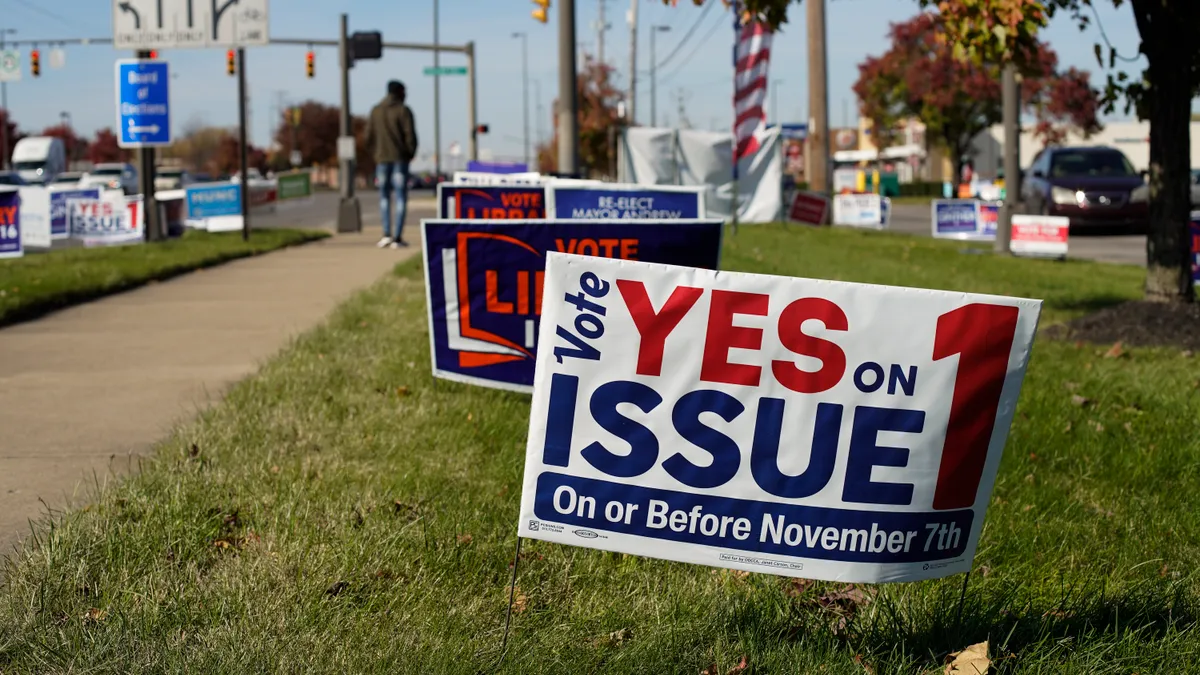Dive Brief:
- Ohio voters approved a constitutional amendment Tuesday safeguarding abortion access and other forms of reproductive healthcare, marking another major victory for abortion rights supporters since Roe v. Wade was overturned by the U.S. Supreme Court last year.
- Approximately 56.6% of voters in Ohio ratified Issue 1 — an amendment to Article I of the Ohio Constitution that will add a section titled “The Right to Reproductive Freedom with Protections for Health and Safety” into the state’s constitution. The amendment provides Ohioans the “right to make and carry out one’s own reproductive decisions.”
- The election result will have a ripple effect on not just residents of the state, but also companies headquartered in Ohio, such as Kroger, Procter & Gamble, Goodyear and Designer Shoe Warehouse, among others.
Dive Insight:
Ohio’s election results could serve as a litmus test for nationwide and statewide messaging on reproductive healthcare rights ahead of the 2024 elections. The issue is expected to show up on ballots in Arizona and Missouri next year as well.
The Buckeye State was the only state to put abortion rights on the ballot this year, and is the latest addition to a list of seven states where voters decided to protect reproductive healthcare after the Supreme Court’s ruling.
Ohio’s support for abortion access and reproductive healthcare is also a signal for companies headquartered in the state and their corporate policies surrounding social issues. The state is home to several large corporations, including supermarket chain Kroger, based in Cincinnati and the employer of nearly half a million people across the country.
Kroger’s ESG policy surrounding its “people pillar” is based on two central topics: food access and health and safety. Though the company’s 2023 ESG report outlines measures it has taken to promote health equity, the document doesn’t outrightly mention reproductive healthcare and abortion access initiatives for employees.
“Kroger recognizes that upstream factors like existing policies and legislation affect equitable access to health services,” the report states.
However, after the Supreme Court’s decision eliminated the constitutional right to an abortion, the grocer said it would cover some of the costs of an employee’s out-of-state travel related to an abortion procedure as part of the company’s healthcare and benefits coverage. The company covers up to $4,000 in travel benefits “to facilitate access to quality care for several categories of medical treatments and a full range of reproductive health care services, including abortion and fertility treatments,” Kroger said in a June 2022 statement.
According to company data, Kroger has over 211 stores in Ohio and employs 35,954 people in the state.
Similar to Kroger, Cincinnati-based P&G also said it would cover travel costs for employees seeking abortion following the overturning of Roe v. Wade. The consumer goods manufacturer said it would pay for travel expenses incurred for medical procedures, including abortion, if a healthcare provider wasn’t available within a 50-mile radius beginning Jan. 1, 2023. At the time of the announcement, Ohio had a six-week abortion ban in place.
“We will continue to monitor policy and legal developments to determine any potential impact to our healthcare plans to ensure compliance with applicable laws,” P&G said in a statement last year.
The global manufacturer — which is the parent company behind cleaning and hygiene products such as Tide, Gillete, Pantene, Pampers and more — has about 11,000 employees in Ohio.
While Kroger and P&G have public stances on abortion healthcare coverage, others such as Akron-based Goodyear and Columbus-based DSW have not provided details in their company reports after Roe.














